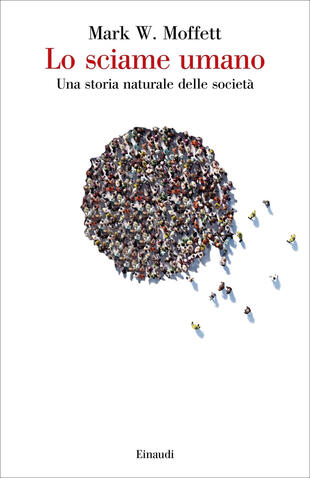

Sinossi
Immaginate un aeroporto gremito di gente che attende tranquilla il proprio volo. Ora sostituite quel pacifico ed eterogeneo gruppo di uomini con degli scimpanzé: vedrete ben presto subentrare inquietudine e panico, ed è certo che di lì a poco avrà luogo una carneficina. Infatti, se uno scimpanzé si avventurasse nel territorio di un altro gruppo di scimmie verrebbe quasi certamente aggredito e ucciso. Viceversa, noi umani possiamo coesistere armoniosamente in luoghi pubblici insieme a una quantità di persone che non conosciamo. Com'è possibile? Nel suo rivoluzionario libro, il biologo Mark W. Moffett utilizza gli strumenti dell'osservazione etologica incrociandoli con le più recenti scoperte in ambito antropologico, psicologico, sociologico e storico per spiegare i comportamenti alla base delle società umane; s'interroga sulle origini e le implicazioni della nostra complessa organizzazione sociale e su come le nostre differenze etniche e nazionali trovino corrispondenza in quelle di altre specie animali. Per farlo, studia le forme di convivenza di primati e formiche così come delle comunità umane nell'età dei cacciatori-raccoglitori, e mette a fuoco le relazioni tra identità di gruppo e anonimato, chiave di volta per capire come sorgono, si sviluppano, funzionano e declinano le società. «L'idea di questo libro mi è venuta quando vicino a San Diego mi sono imbattuto in un campo di battaglia lungo chilometri, dove due supercolonie di formiche argentine, ciascuna forte di miliardi di individui, difendevano il loro territorio. Questi lillipuziani mi hanno inizialmente portato, nel 2007, a chiedermi in che modo un vasto numero di individui, formiche o esseri umani, potesse davvero costituire una società. Il mio libro analizzerà come, analogamente all'uomo, le formiche reagiscano l'una all'altra di modo che anche le loro società possono essere anonime: noi (e loro) non abbiamo alcun bisogno di conoscerci come individui per mantenere le nostre società distinte. [...] Per quale motivo insomma una componente intrinseca della condizione umana è quella di tenersi stretti a una società, idolatrandola, e al contempo molto spesso insultando, diffidando, umiliando o anche odiando gli stranieri? Questo è uno dei fatti stupefacenti della nostra specie, e uno dei motivi che mi hanno portato a scrivere questo libro. Anche se le nostre società da piccole sono diventate immense, abbiamo conservato una sorprendente consapevolezza di chi può farne parte e chi no. È vero, stabiliamo amicizie con gli stranieri, ma restano stranieri. Nel bene e nel male la distinzione rimane, con discriminazioni ugualmente pronunciate e spesso distruttive che montano all'interno delle società stesse, per ragioni che spero di riuscire a chiarire. Il modo in cui affrontiamo somiglianze e differenze determina la natura e il futuro delle società».
- ISBN: 880622445X
- Casa Editrice: Einaudi
- Pagine: 576
- Data di uscita: 12-05-2020
Recensioni
In most accounts of world or macro history, you get a few introductory sections or chapters on our hunter-gather past before moving on to the civilizations of written history. Yet 6,000 years of written history represents only three percent of our collective 200,000 year history as a species. Surely Leggi tutto
What a strange book. I hoped, based on the titles and reviews, to find some overarching way to look at our modern anomized huge society differently. A new perspective. What this book is instead is a series of reinforced belabored concepts about the human tendency to find nothing of value in other so Leggi tutto
An exhaustively researched analysis of human tribalism and the evolutionary underpinnings of in-group selection, cultural identifiers, and racism, for some reason put together by a tropical biologist who specializes in insects. Humans are unique in that they can pass other, strange humans on the stre Leggi tutto
It's very difficult to put together a review that does this book justice. Admittedly not only is the topic right in my wheelhouse at the moment, but Human Swarm fits well with having 'Sapiens' and 'Guns, Germs and Steel' as precursor reading... (Not saying you have to have read those pieces just tha Leggi tutto
Human beings are lauded by human beings as the greatest thing since sliced bread; a thing that they invented. The main problem is that people don’t have a real comparison to go against. Human beings are closely related to Chimpanzees, this is something that is a biological fact. Although humans and Leggi tutto
Beautifully written, but the book is definitely not “Sapiens” by Yuval Harari or Jared Diamond, sorry for benchmark, but it is. Collection of interesting facts and parallels about social insects and hunter-gatherer societies - this is fine, but overall I can’t find any new insights or different pers Leggi tutto
This is a book written by an amateur who pretends to be an expert. Come on, just because you are a biologist, it doesn't mean you can claim yourself as a sociologist! There is few meaningful insight or scientific proof. Also, the book is very hard to read.
Citazioni
Al momento non ci sono citazioni, inserisci tu la prima!























